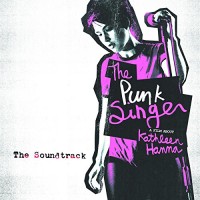Bikini Kill, and by extension Kathleen Hannah, are the two names that come to most people’s minds when you mention the word Riot Grrl. When the band released Reject All American in 1996, the genre was evolving into something very different than it had been just four years ago and Kathleen Hannah was also going through a musical metamorphosis of her own, a year later Bikini Kill would no longer exist and Hannah would release her solo album Julie Ruin. The band assembled to tour behind Julie Ruin would go on to become Le Tigre just a few years after that.
               The biggest change people were likely to have noticed between this album and its predecessor, Pussy Whipped, is the band stepped up their songwriting to incorporate pop hooks. And it works, had Hannah not called for a media blackout by Riot Grrl bands it is very likely this album could have propelled the band into the mainstream of alternative rock. However, one only need listen to the lyrics of the first song to realize this band put their ethical and political views first. When Kathleen Hannah screams, “Mirror mirror on the wall, who’s the fairest one of all? I don’t really care at all.†She does so with a level of earnestness that wasn’t found many places in the music business at the point; underground, mainstream, or otherwise.  Further evidence of the band not caring about mainstream coverage and the issues that come with can be found in one line on the song “Tony Randall,†where Kathleen sings, “I see a punk club, he sees a strip bar.â€
               While the lyrics were as visceral and cathartic as ever the big step up, as previously mentioned, was the songwriting. While the band shared the same geographic background as many bands in Seattle, they never had what many called the “Seattle Sound.†It’s worth noting though, if you compare Alice In Chains and Soundgarden to Nirvana and Mudhoney that entire concept of a singular sound was complete bullshit. The steps forward in songwriting and more nuanced guitar playing brought this band into the same realm as the latter two bands though. Every song on here is a great song, but it will also kick your ass the whole time you’re listening to it.
               With Seattle in mind, it’s worth noting that Kathleen Hannah played a pivotal role in the grunge rock explosion, if only through sheer luck. The story, which has been corroborated by numerous parties, is that Kathleen wrote “Kurt smells like teen spirit†on the wall of his apartment. Thinking the statement had far more revolutionary connotations than it actually did. It turned out Bikini Kill drummer and Kurt’s then girlfriend, Tobi Vail, wore Teen Spirit deodorant. Kurt and Kathleen’s friendship extended beyond mutual friendships though, as she penned the song “R.I.P†(Rest In Pissed Off-ness) in his memory. While many bands would write songs about Cobain in the years following his suicide, this one has always struck me as the most honest. It certainly pays tribute to his musical and social contributions to the music scene, but it doesn’t spare him the anger many other songs did. The delivery of the lines, “And I wouldn't be so fucking mad so fucking pissed off if it wasn't so fucking wrong. It's all fucking wrong. It's not fair, it's not fair, it's not fair,†may be the only time that a Bikini Kill song has ever brought me to tears. I would imagine it would do the same that lost anyone they cared about to suicide, addiction, or any other horrific event.
               Every song on this album burns with passion and emotion. I would dare say that while Bikini Kill wasn’t one of the best bands of the nineties, they were one of the most honest. Whether the songs were about gender violence, sexual politics, or mocking seemingly unconventional mainstream tropes like New Age medicine you never got the sense the band was putting you on, and maybe we’re lucky the band never reached a point where that became a struggle they had by continuing after this album moved them a little closer to mainstream.
               While
there’s nothing on this album that gets your attention like the marching snare
at start of “Rebel Girl†I think this album is a more complete artistic
statement. The band tries out different shades of punk rock here, and even
delves into the alternative rock realm on some songs. Maybe it’s not the
classic, and it certainly doesn’t have any songs that were anthems for a
generation of women in the punk scene. But, as far as swan songs from the
nineties go, I’ll put this right up there with the best of them.Â
